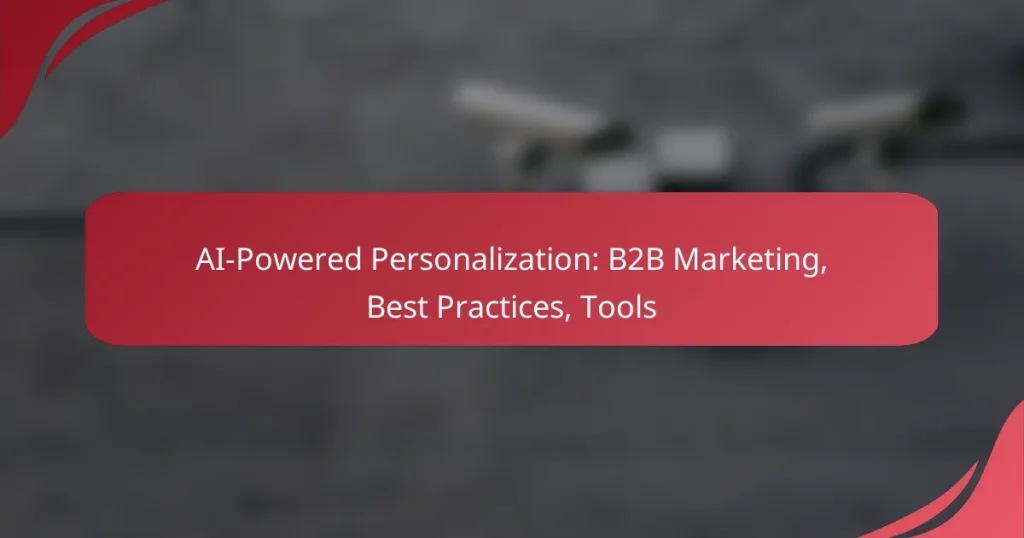AI-powered personalization is revolutionizing B2B marketing by enabling businesses to analyze extensive data sets and tailor experiences for individual clients. By implementing best practices and utilizing essential tools, companies can create targeted strategies that resonate with specific audience segments, ultimately enhancing engagement and boosting conversion rates.
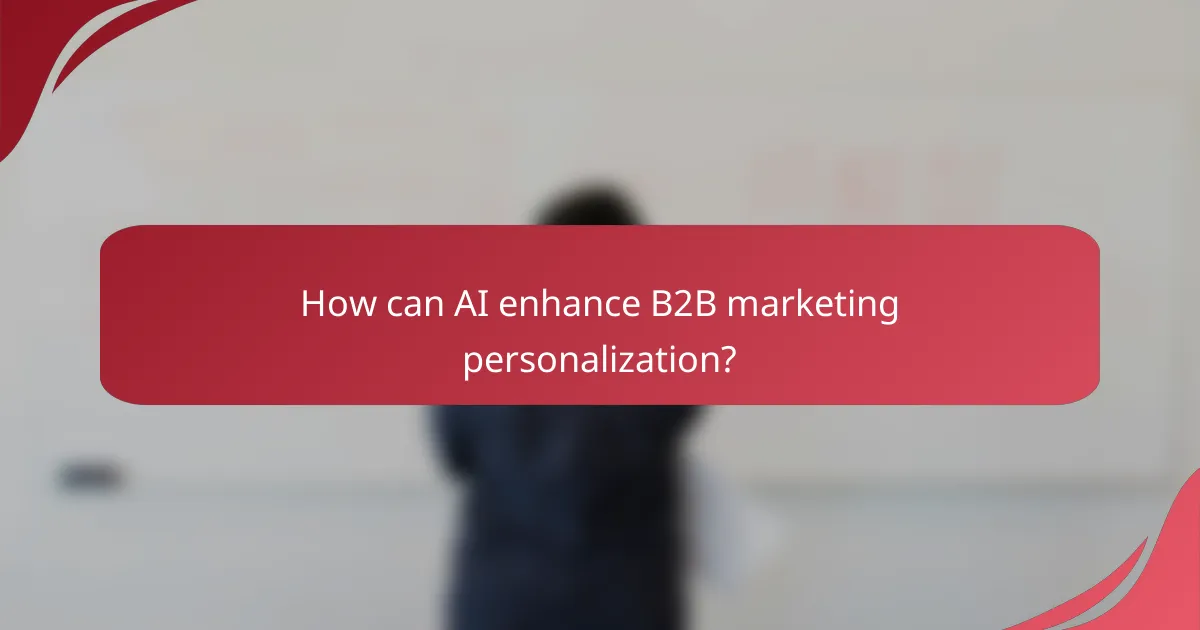
How can AI enhance B2B marketing personalization?
AI can significantly enhance B2B marketing personalization by analyzing vast amounts of data to tailor experiences for individual clients. This technology allows businesses to create targeted strategies that resonate with specific audience segments, improving engagement and conversion rates.
Improved customer segmentation
AI enhances customer segmentation by utilizing machine learning algorithms to analyze customer data, identifying patterns and behaviors that traditional methods might miss. This allows businesses to create more nuanced segments based on factors like purchasing history, engagement levels, and demographic information.
For instance, a B2B company could segment its clients into categories such as high-value customers, potential upsell targets, and at-risk accounts. This targeted approach enables personalized marketing strategies that are more likely to resonate with each group.
Dynamic content recommendations
Dynamic content recommendations powered by AI adapt marketing materials in real-time based on user interactions and preferences. By analyzing user behavior, AI can suggest relevant products, services, or content that align with the user’s interests, leading to higher engagement rates.
For example, if a client frequently engages with content about cloud solutions, AI can prioritize similar topics in email campaigns or website content. This personalization increases the likelihood of conversion by presenting users with what they are most interested in.
Predictive analytics for lead scoring
Predictive analytics in lead scoring uses AI to evaluate potential leads based on historical data and behavior patterns. This method helps sales teams prioritize leads that are more likely to convert, optimizing their efforts and resources.
By analyzing factors such as engagement history, company size, and industry trends, businesses can assign scores to leads, focusing on those with the highest potential. Implementing this strategy can lead to more efficient sales processes and improved ROI on marketing investments.
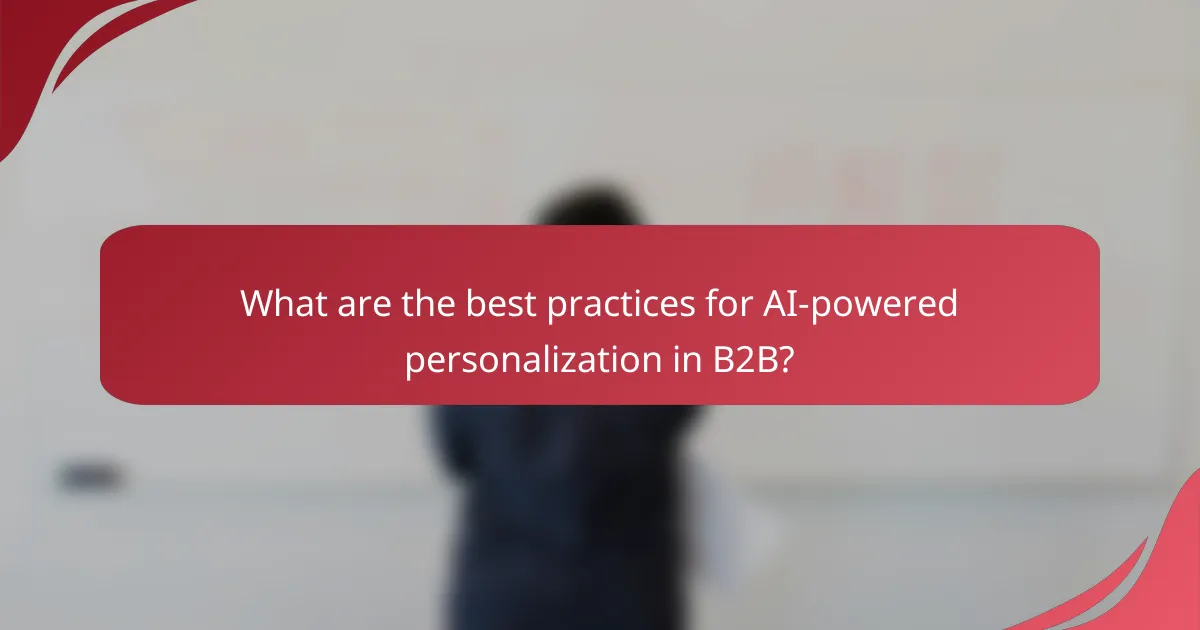
What are the best practices for AI-powered personalization in B2B?
Best practices for AI-powered personalization in B2B focus on leveraging data, integrating with existing systems, and continuously optimizing strategies. These practices ensure that marketing efforts are tailored to the unique needs of business clients, enhancing engagement and conversion rates.
Data-driven decision making
Data-driven decision making is essential for effective AI-powered personalization. Businesses should collect and analyze customer data from various sources, including website interactions, social media, and purchase history, to understand client preferences and behaviors.
Utilizing analytics tools can help identify trends and insights that inform marketing strategies. For instance, segmenting customers based on their buying patterns can lead to more targeted campaigns, improving the likelihood of engagement.
Integrating AI with CRM systems
Integrating AI with Customer Relationship Management (CRM) systems enhances the personalization process by streamlining data access and analysis. This integration allows businesses to utilize AI algorithms to predict customer needs and tailor communications accordingly.
For example, AI can automate lead scoring within a CRM, highlighting which prospects are most likely to convert. This enables sales teams to prioritize their efforts effectively, focusing on high-value leads.
Continuous testing and optimization
Continuous testing and optimization are crucial for refining AI-powered personalization strategies. Regularly testing different approaches, such as email subject lines or content formats, helps identify what resonates best with target audiences.
Utilizing A/B testing can provide insights into customer preferences, allowing businesses to adjust their tactics in real-time. Monitoring key performance indicators (KPIs) such as open rates and conversion rates ensures that marketing efforts remain effective and relevant.
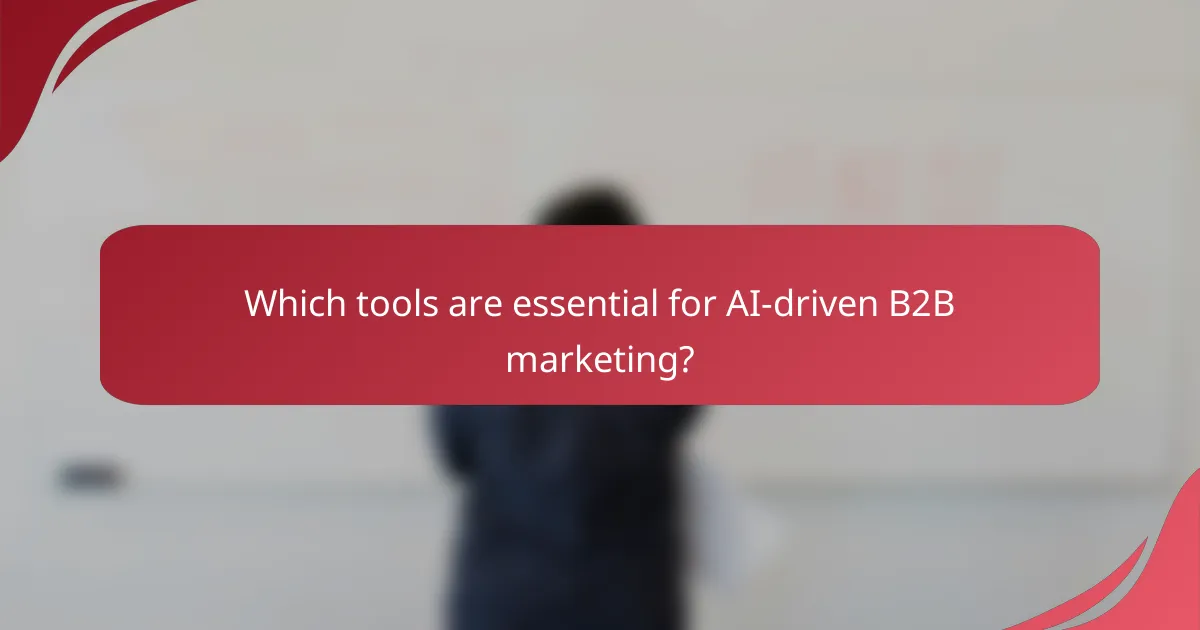
Which tools are essential for AI-driven B2B marketing?
Essential tools for AI-driven B2B marketing include platforms that automate processes, provide predictive analytics, and enable personalized campaigns. These tools help businesses enhance customer engagement and optimize marketing strategies through data-driven insights.
HubSpot for marketing automation
HubSpot is a comprehensive marketing automation platform that streamlines various marketing tasks, such as email campaigns, social media management, and lead tracking. Its AI capabilities allow for segmentation and targeting, ensuring that marketing messages reach the right audience at the right time.
When using HubSpot, consider integrating its CRM features to manage customer relationships effectively. This integration can improve lead nurturing and conversion rates, making your marketing efforts more efficient.
Salesforce Einstein for predictive insights
Salesforce Einstein leverages AI to provide predictive insights that help businesses make informed decisions. By analyzing customer data, it can forecast sales trends and identify potential leads, allowing marketers to focus their efforts on high-value prospects.
To maximize the benefits of Salesforce Einstein, ensure that your data is clean and well-organized. Regularly updating your datasets will enhance the accuracy of the predictions, leading to better-targeted marketing strategies.
Marketo for personalized campaigns
Marketo specializes in creating personalized marketing campaigns that resonate with individual customer preferences. Its AI-driven features enable dynamic content delivery, ensuring that each customer receives tailored messages based on their behavior and interests.
When implementing Marketo, utilize its analytics tools to track campaign performance. This data can inform future strategies and help refine your approach to personalization, ultimately improving customer engagement and conversion rates.
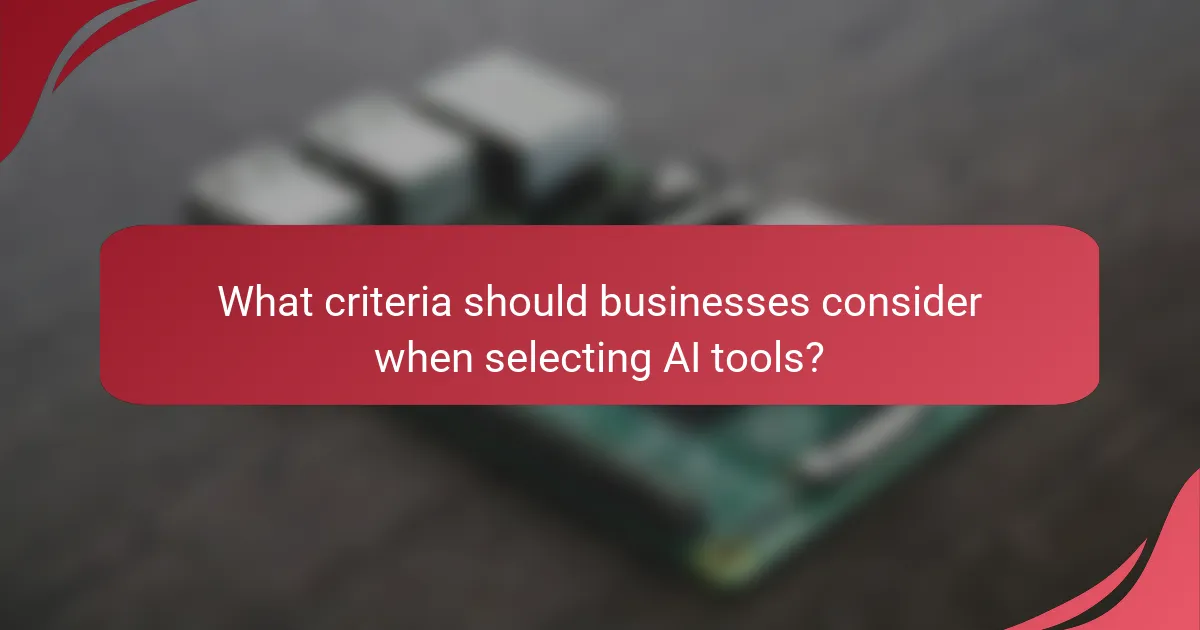
What criteria should businesses consider when selecting AI tools?
When selecting AI tools, businesses should prioritize functionality, ease of use, and alignment with their specific marketing goals. Key criteria include scalability, integration capabilities, and the ability to deliver actionable insights.
Scalability of the platform
Scalability refers to the ability of an AI tool to grow with your business needs. A scalable platform can handle increased data volumes and user demands without sacrificing performance. Look for solutions that offer flexible pricing models and can expand features as your business evolves.
Consider tools that can seamlessly accommodate additional users and functionalities. For instance, if your company plans to increase its marketing efforts, ensure the AI tool can manage larger datasets and more complex algorithms without significant delays or extra costs.
Integration capabilities with existing systems
Integration capabilities are crucial for ensuring that new AI tools work harmoniously with your existing systems. A tool that easily integrates with your CRM, email marketing software, and analytics platforms can streamline workflows and enhance data accuracy. Check for APIs and pre-built connectors that facilitate these integrations.
Evaluate how well the AI tool can share data across platforms. For example, if it can automatically sync customer data from your CRM to your marketing automation system, it saves time and reduces the risk of errors. Prioritize tools that offer robust support for integration to maximize your marketing efficiency.
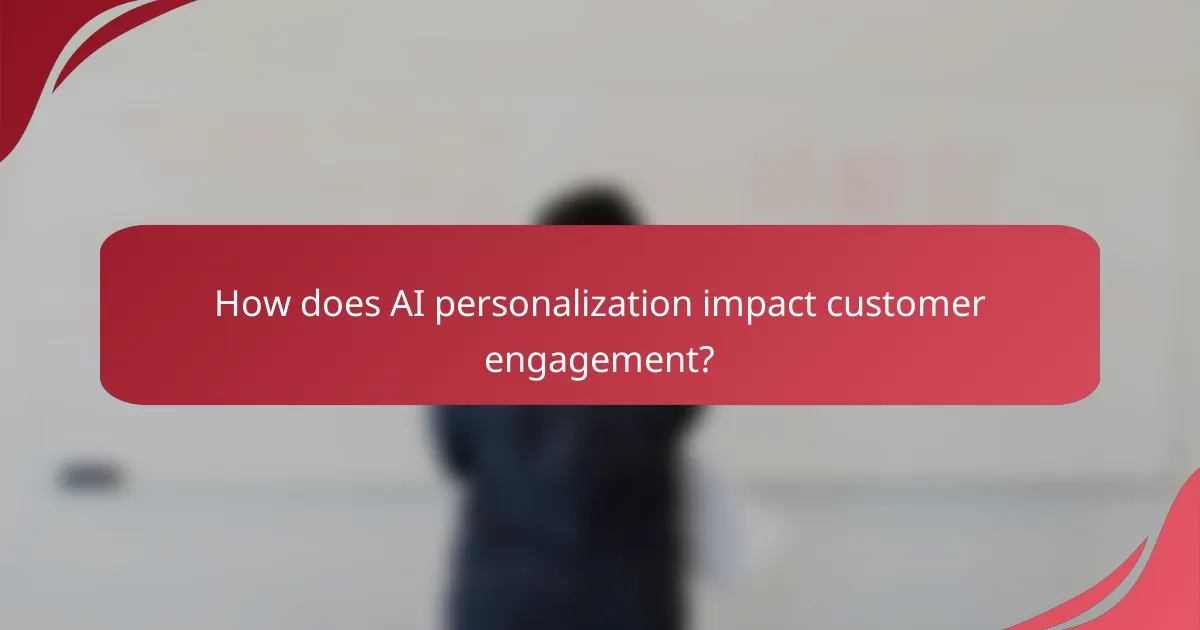
How does AI personalization impact customer engagement?
AI personalization significantly enhances customer engagement by tailoring experiences to individual preferences and behaviors. This targeted approach leads to more relevant interactions, increasing the likelihood of customer retention and satisfaction.
Increased conversion rates
AI personalization can lead to higher conversion rates by delivering customized content and product recommendations that resonate with potential buyers. For instance, businesses using AI-driven insights can optimize their marketing campaigns to target specific demographics, resulting in conversion improvements of up to 30% in some cases.
To maximize conversion rates, companies should analyze customer data to identify trends and preferences. Implementing A/B testing can help determine which personalized strategies yield the best results, ensuring that marketing efforts are both effective and efficient.
Enhanced customer loyalty
Personalized experiences foster stronger customer loyalty by making clients feel valued and understood. When customers receive tailored communications and offers, they are more likely to develop a long-term relationship with the brand, leading to repeat purchases and advocacy.
To enhance loyalty, businesses should focus on creating a seamless and personalized customer journey across all touchpoints. Regularly updating personalization strategies based on customer feedback and behavior can help maintain engagement and prevent churn.
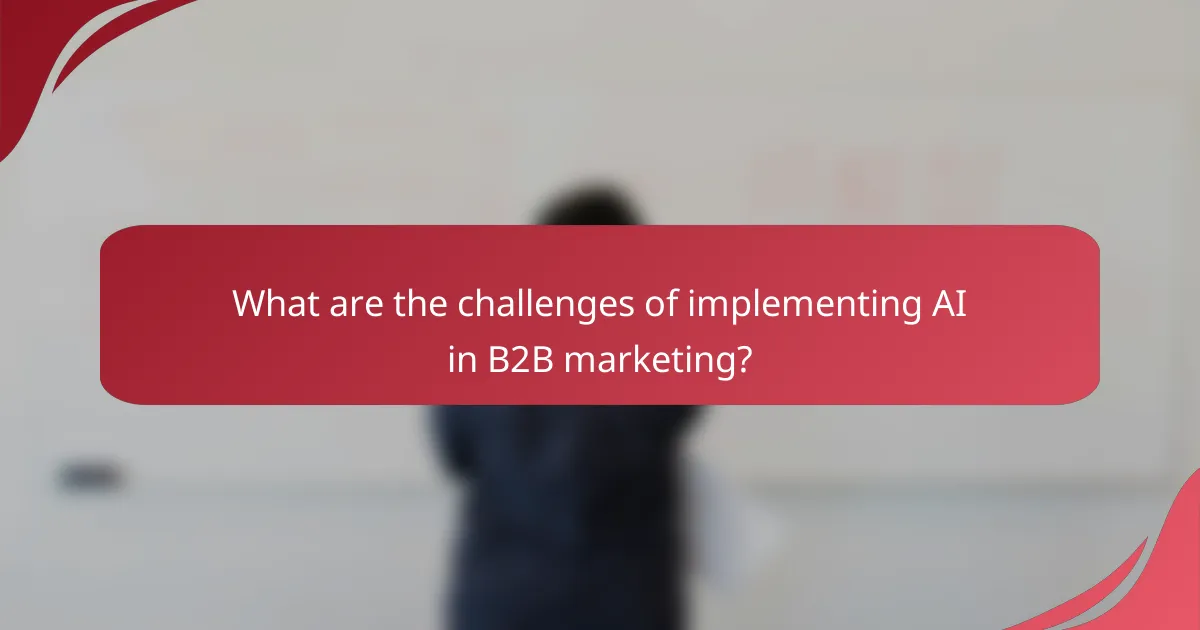
What are the challenges of implementing AI in B2B marketing?
Implementing AI in B2B marketing presents several challenges, primarily revolving around data privacy, high costs, and the complexity of integration. Companies must navigate these hurdles to effectively leverage AI for personalized marketing strategies.
Data privacy concerns
Data privacy is a significant challenge when implementing AI in B2B marketing. Businesses must comply with regulations such as GDPR in Europe or CCPA in California, which impose strict guidelines on data collection and usage. Failing to adhere to these regulations can result in hefty fines and damage to reputation.
To address data privacy concerns, companies should prioritize transparency with their customers about how their data will be used. Implementing robust data security measures and obtaining explicit consent can help build trust and ensure compliance.
High implementation costs
The costs associated with implementing AI technology in B2B marketing can be substantial. Initial investments may include software licenses, hardware upgrades, and hiring skilled personnel, which can total tens of thousands to hundreds of thousands of dollars depending on the scale of the project.
To manage these costs, businesses should consider starting with pilot programs that focus on specific use cases. This approach allows for gradual investment and helps demonstrate ROI before committing to larger-scale implementations.
